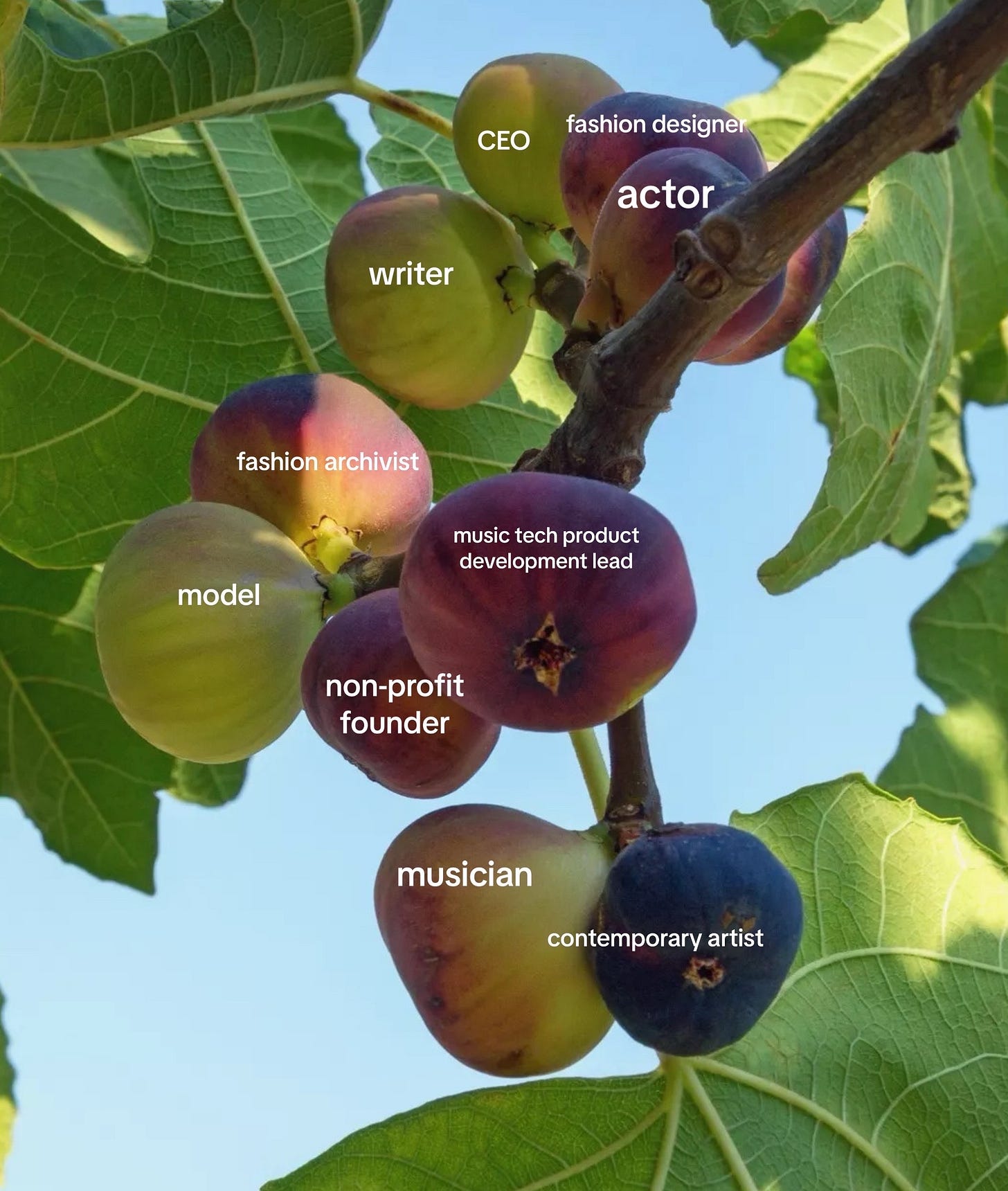Solving The Fig Tree Problem
What Are You Doing With Your Life?
We all want to be all-in on our dreams. Who wouldn’t want to achieve rounding error top-percentile greatness, the sharp upward climb towards demi-god status? When we’re young, we model our greatest hopes on those who found their purpose early and never wavered: the Beckhams, the Beyonces, the Biebers- those who had the steepest climb to their current status. Taken to its logical conclusion, to achieve a similarly climbing upward slope, we’d need to make hard and fast decisions early on our purpose. For people who have many dreams, deciding a branching strategy can be nearly impossible and completely paralysing. There can be a distinct feeling that it’s already too late.
A young Sylvia Path describes the experience of reflecting on her possible lives in the Bell Jar- an excerpt of which recently went viral on Tiktok:
“I saw my life branching out before me like the green fig tree in the story. From the tip of every branch, like a fat purple fig, a wonderful future beckoned and winked. One fig was a husband and a happy home and children, and another fig was a famous poet and another fig was a brilliant professor, and another fig was Ee Gee, the amazing editor, and another fig was Europe and Africa and South America, and another fig was Constantin and Socrates and Attila and a pack of other lovers with queer names and offbeat professions, and another fig was an Olympic lady crew champion, and beyond and above these figs were many more figs I couldn't quite make out. I saw myself sitting in the crotch of this fig tree, starving to death, just because I couldn't make up my mind which of the figs I would choose. I wanted each and every one of them, but choosing one meant losing all the rest, and, as I sat there, unable to decide, the figs began to wrinkle and go black, and, one by one, they plopped to the ground at my feet.” - Sylvia Plath, The Bell Jar
Attempt at my fig tree. Needed more figs..
Sylvia’s insights lead us to know for certain at least one thing, that the only unacceptable decision is none at all. But, still- that’s not a particularly sufficient strategy. So, what ways might we build a strategy so that we each have the best possible chance of the steeply climbing trajectory we’re all looking for? Do we even need to?
Here’s a set exercises to help you think through your dreams, based on tried and true strategy methods, some borrowed from product development, business and some from life-coaching.
Exercise Part One: What Do You Want To Be When You Grow Up?
The first part of the exercise is freeform dream brainstorming, meant to pull out honest and self-aware ideas and interests. Allow yourself to be completely non judgemental- you might want to start this as a free form journal entry about all the things you’re interested in. In addition, write down the most noble, and the silliest reason you’re interested this dream. When complete, your writing should satisfy these two requirements:
A List of Figs or “Dream Lives”: Be as honest and random as you want here. I’d like to have the exact music career Rihanna had, for example. I also want to be a jewellery designer and top model.
List your whys, while staying totally open-minded: list both the most noble, and the most silly or selfish reason why this dream is interesting to you. I’d like to have Rihanna’s music career because I’d like to inspire other women with my larger than life pop-persona. I would also like to be able to have access to the coolest designer clothes and creative people in the world. Both of these motivations are probably true.
At the end of this exercise you should be left with your inner-child's vision for how you can fulfil your heart's desires, and honest insights into why they might matter. The more this list has the vibe of a toddler saying they want to be a firefighter when they grow up because firefighters are brave, and fire is cool, the better.
Exercise Part Two: Be the Freudian Psychoanalyst
Next, you’re going to play the role of your own psychoanalyst. Imagine the older, wiser version of yourself who happens to be have a PhD in Psychology and who is renowned for their gentle, sensitive, and revealing advice. In this vision you have infinite money for the best therapists in the biz. They’re wearing Max Mara in an office full of Charles Eames furniture and they're asking you questions “and why is this important to you?” or “And why do you value that?”
“and why is this important to you?”
Here, you’re going to try to get to the root of your motivations- to unveil them as values. This will help make exceptionally clear the real thing you’re looking for. This is like when relationship coaches say “you need to have the same values as your partner”. You’re trying to reveal what values motivate your inner-child's life fantasies.
IMPORTANT NOTE: People often tend to assume “values” must be virtuous statements such as- “I value honesty”. This is not the case. If you're trying too hard to make them all virtuous, you're probably not being honest. When you define your values, you need only apply these criteria to check if you’re doing it right (at least for the purposes of this exercise):
An honest, truthful representation of something that motivates you or governs your behaviour
Be as atomic as possible (the value should be reduced to its smallest possible unit-if it can be reduced to a simpler concept and still be true, do it)
Example:
“I’d like to have the exact music career Rihanna has”:
Rihanna is a successful, extremely cool and well-liked pop musician who has had a very interesting and decorated career including multiple businesses, and cult-status for her personal style. I would also like that.
Rihanna is known for being a creative and brave individual, and is respected for being both, while also being seen as cool.
Rihanna has access to some of the best vintage fashion in the world, and worked with some of the best stylists alive, and her personal style has become the stuff of legends. I would also like that.
Rihanna gets to make music all day, or do her own entrepreneurial ventures if she wants to.
Becomes these values:
I want to be respected for my creativity
I want to be a source of inspiration for others
I want to be known broadly for my personal style
I want to be known for my music
I want to have access to rare designer clothes
I want to be able to start my own entrepreneurial ventures
I want access to the most talented creative people in the world, and for them to work on my ideas
I would like to live in abundance
I want to be completely self-assured
I want to be seen as cool
At the end of this exercise you’ve arrived with bullet-points on what you’re actually trying to achieve. This is the exciting part, as you’ve just unlocked the ability to uncover your own competitive advantage, and to draft a plan, and to win.
Exercise Part Three: Be The Strategic Consultant
“We’re going to uncover your competitive advantage!”
If you are a sane person, you probably know that attempting to recreate the steps Rihanna took in exact order but in your own life will not make you Rihanna. In fact, it would make you extremely weird. Think of success like a burning ladder. Rihanna is always one step ahead, but the ladder is burning one rung behind her as she climbs. The same path she took is no longer available to you.
You’ll now be playing the role of CEO, McKinsey consultant to your own life. Put your business killer hat back on and apply some strategic thinking.
List the Smallest thing you could do right now for each of your values.
This comes from the Product Development Idea of “Minimum Viable Product”: which states one should never invest more time and money than necessary developing a product before getting feedback from the market.
Testing a product as soon as possible allows you to see if your solution solves the problem you think it solves, if there’s interest from customers, if it’s worth investing in the features you have in mind.
This is what you’re going to do with your values. The key here is to become a doer who reacts to real-world feedback, and who practises trying and failing in public without letting it stop you or slow you down.
What’s the smallest thing you could do to make progress towards the thing you value? Could you do something today?
Here’s what an MVPs for some of my values looks like right now, for example:
I want to be respected for my creativity
I want to be a source of inspiration for others
I want to be able to start my own entrepreneurial ventures
I want access to the most talented creative people in the world, and for them to work on my ideas
I would like to live in abundance
I can write and publish a Substack article today- this very one I’m writing, yippee!
MVPs must be clear and small enough in scope to act upon. Lots of ambition dies because goals are simply too lofty and undefined. “I want to release an album” is not clear enough.
You should instead break it down into clear, achievable and testable sections like: “today I will open my music software and make a beat” or “I will take the existing beat I like and re-record vocals”.
In my experience, if I’m not achieving my goals it’s almost always because there’s a part of me that refuses to break down the goal into achievable steps, often due to a mix of fear and sometimes unclarity about what the actual steps might be, but usually fear. Reject that.
Longer Term Strategic Decision-Making:
Now let’s say even the smallest possible scope of your dream requires quite a bit of planning and branching choices. Maybe you dream of being a Neurosurgeon. Although you can most likely test this with some form of MVP activities, nobody wants you doing surgery unless you’ve spent years becoming a doctor.
Before you make a significant branching decision, you’re going to want to do a cost-benefit analysis, and you’re going to want to do diligence.
Cost Benefit Analysis: For each dream, what benefits and what are the costs? What skills or time commitment would you need to get there? How competitive is it to live this kind of dream? You can do a real-world cost benefit analysis, or you can just make a pros/cons list here.
Risk Analysis: If you were to fail, would you have learned skills that you’d be able to apply to other areas you’re interested in? Is the decision you’re making synergetic with multiple values you have, or just one?
Depending on your risk tolerance, I’d personally suggest going for things where the learnings you expect are synergistic with at least most of your values, because then you’re guaranteed to be able to learn something that will benefit you in the future because it still complies with your values.
Uncover Your Competitive Advantage
The best companies are great because they’re different. Their organisational chart is different, their working methods are different, and they target a different problem to solve than their competitors. This is what greatness actually looks like in business- think your Apple, your Google, they have arrived at their own “difference” by staying perpetually open-minded, by never accepting that there’s a singular “correct” way to do things. They instead optimise for finding the best way to solve a problem that’s important better than other people. I believe the best way to uncover competitive advantage is to actually do small things and refine your values, as mentioned above, and then to try to find important problems to solve differently or better than others. Competitive Advantage can emerge as you figure out what you’re a killer at, and what you really enjoy.
Closing Remarks:
If you’re living according to your values, in some ways, you get the benefits of getting to live all of the figs at the same time “a famous poet and another fig was a brilliant professor, and another fig was Ee Gee, the amazing editor.” In fact- all of these figs share the same values- of being respected for one’s creative and intellectual work in literature.
So, go on- and do something, won’t you?






Celeste you ate. This was such an inspiring post.